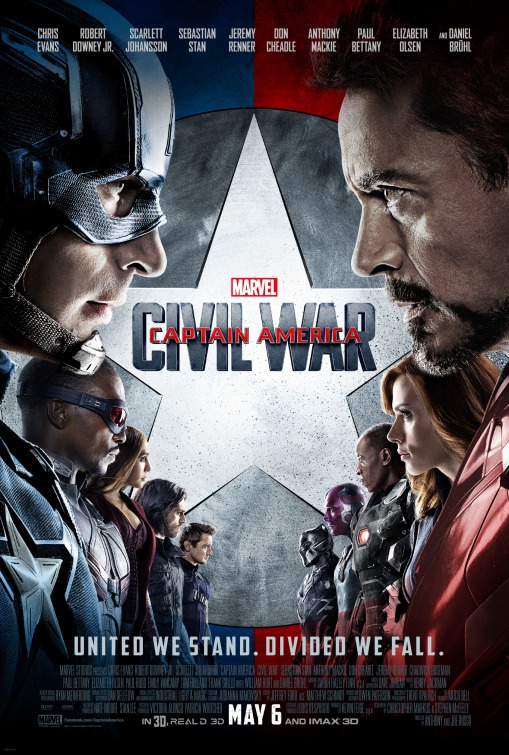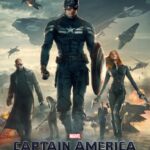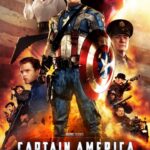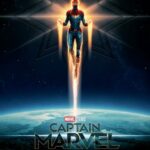United We Stand. Divided We Fall.
Director
Anthony Russo
Joe Russo
Starring
Chris Evans
Robert Downey Jr
Sebastian Stan
Rather than just being a sequel to the second Captain America film, Civil War takes stock of the total impact of a world in which superheroes police the day-to-day extraordinary (an oxymoronic sentence if ever I wrote one). Steve Rogers/Captain America [Evans] is still heading Avengers taskforce operations as they seek out remaining HYDRA threats. However, after an accident in Lagos leads to civilian deaths, public outcry increases and accountability dominates every official conversation. Meanwhile, Rogers is pursuing his former colleague and best friend, Bucky Barnes/The Winter Soldier [Stan] hoping he can bring him in and plead his case for every offence committed while brainwashed as the Russian/HYDRA assassin. And stood in his way is a beleaguered Tony Stark [Downey Jr] who feels that oversight might not be the worst idea and with lives on the line, neither hero wants to back down.
Amazingly, the script actually improves on its comic origins (which is saying something) by making both sides completely level and arguable, rather than an obvious “Tony is the bad guy” or “Steve’s judgement is clouded”. By issue six of Civil War it was apparent that Tony (and Reed Richards) had gone too far but in the film, we never reach that threshold. Both sides have pros and cons to their standings and equally neither perspective is without fault or complication. But that’s what is so great about the writing and the state of this shared fictional universe. There’s enough development in place that we can explore these sorts of stories and arcs without events feeling rushed or forced. Much like the developing relationships in a well-written TV series, these episodic films continue to build on their eight year foundation with pleasing and satisfying gusto.
I must confess I feel bad for the writers over at Marvel. Every time a single character instalment is released people cry out, “Why don’t you just call the Avengers?” Then when the story is relevant enough to include a lot of established supporting characters (who happen to be on the Avengers roster) the same people cry, “What is this, Avengers 2.5? I thought it was a Cap film!” Yet the committee style combination of the Russos, Christopher Markus and Stephen McFeely ensure that a solid standalone story is told while still servicing all the tick-box beats one would expect from a major interconnected Marvel release. Functionally, the film is great; despite being the Marvel film with the longest runtime, the pacing is so expertly executed that it really doesn’t feel it. The script isn’t bloated by excessive or unnecessary threads and while one could argue a shaving of certain scenes could condense the film a little better, the nuances of humour, friendship and philosophy are explored just enough to enhance the exposition-heavy scenes and the all-out melees. Henry Jackman has returned to the composer’s chair once again and he does a fine job but I think it lacked the identity of his previous outing.
It’s exceptionally hard to fault this film because with every new Marvel instalment we’re wading deeper into unchartered waters. The standard rules of closure, story-telling, character evolution and narrative pacing don’t necessarily apply in the same way. One could easily argue that the central narrative strut hinges too heavily on previous releases or that villains previously set up as important are dealt with in the first act but these complaints dissolve in the face of the pleasingly crafted, ever-expanding fictional universe. Using those two examples alone, the previous films just add more history and foundation to current events and while certain villains (Crossbones) aren’t given the screen-time we might have expected, this shows that things happen outside of the film’s central narrative (i.e. see the tie-in comics or short films, etc).
Even rating things like performances is quite tricky; with every new Marvel film, all we can do is break down analysis of the performances into three categories: noting continued character evolution in light of all that has passed, scrutinising the new additions and observing how elements from other standalones gel. At the centre of this story is the continued head-butting of the MCU’s main pillars. Robert Downey Jr’s Tony Stark is still dealing with the PTSD that no one seems to care about and he’s continually trying to make up for his colossal mistakes – both a rehash and full circle element to his performance and motivations in the very first MCU film. It’s a real and growing character that has endured successfully for nearly a decade without contradicting or betraying said character’s core. While Steve Rogers continues to be the uncompromising bastion of truth, justice and the American way (yep, went there) that he ought to be without being cheesy and stupid. The man is still trying to find his place while exercising the principles he believes to be unequivocally right and Evans executes it so perfectly, admirably and inspirationally. To save my wordcount, I’ve touched upon the two big new entries in my highlighted character segment below.
The only thing I could legitimately criticise is the fact that the villains are still the same. Every Marvel film seems to pit their heroes against either a crazy white guy or a monster. And while Zemo is performed well, he still adheres to the standard formula and in all honesty, initiates the same plan as Whiplash in Iron Man 2; albeit with more layers and complexity. Specifically the film returns to the nature of vengeance and how we deal with it. And yet our cultural antagonists, from folktales to film, have always reflected our cultural times and the foes we believe surround us. Rich guys in suits are disliked and untrusted by the general public and in light of global terrorism, we tend to show unity in the face of monstrosities – be they action or embodiment. Also, while I mentioned the improvements made over the source material, at the same time it doesn’t have exactly the same impact. The comic version started with a more shocking and powerful statement/incident and affected a much wider roster of characters and while the Marvel Cinematic Universe has a substantial range to juggle from (especially if one were to include the ABC and Netflix respective stables) it’s doesn’t feel as monumental as some of the threats in The Avengers or Age Of Ultron. But then maybe that’s the way it should be. Again, I keep coming back to the problem of defining how these films should be critiqued and if I’m perfectly honest, it’s quite exciting. Being a critic you get so used to formula that it’s only when something truly challenging or unique comes along that you rave about it, only for the damn thing to be rejected by the public. Marvel seems to be hitting this weird stride of pleasing the box office and critical crowds. Damn it. Was trying to make a negative point and worked it back to a pioneering compliment.
As stated, it’s very hard to find fault in this film for the combination of decent storytelling, compelling convincing acting and sheer fan-service. But having seen how horribly this film could have gone (in the form of Batman v Superman: Dawn Of Justice) I think we all got lucky and no matter how it might be behind the scenes, Feige’s vision for this ridiculous unparalleled cinematic achievement will be talked about and haphazardly replicated (or at least attempted) for decades. It may not be a popular statement but no matter what you think of these blockbuster films, they are genuinely changing the studio film industry.
Release Date:
29th April 2016
The Scene To Look Out For:
**Spoiler paragraph**
This may be a really odd thing to highlight in a film packed with notable scenes, performances and moments but I really liked a very simple moment during Peggy Carter’s funeral. Much like Superman, in the wrong hands, Captain America is a really annoying character; as such I’m not a fan of how he is depicted throughout most of his comic history. Having said that, one particular quote (in a Spider-Man issue, I think) sums up the character so perfectly and I’ve always loved it. That quote was interestingly reconditioned and used as a Peggy statement from beyond the grave, reminding the super soldier of who he is at his core: “Even if the whole world is telling you to move it is your duty to plant yourself like a tree, look them in the eye and say, ‘No, you move’.”
Notable Characters:
A short while ago, Marvel made the decision not to bother with origin stories anymore. It was certainly a wise choice considering the formulaic repetition and eccentric aspects from the source material. So instead they introduce a new character in a minor or supporting role in a major release, get audiences interested and hyped, then release a solo feature. And in the cases of both Spider-Man [Tom Holland], and Black Panther [Chadwick Boseman], it’s working wonders. Both were given just enough treatment to make them appealing while contributing something worthwhile to the story. No one (mainstream audiences) knew anything about Black Panther and he came away as one of the best loved characters of the film. Not to mention the fact that every time someone mentions a new Spider-Man film we roll our eyes and mutter about how sick we are of that little wall-crawler and then he swings into shot or awkwardly quips through a conversation and we wonder where he’s been this entire time. Sure, it’s ultimately a faceless business model designed to exploit audiences but it’s done so perfectly you can’t help but admire them. Also, Jim Rash effectively playing Dean Pelton was a nice touch.
Highlighted Quote:
“I remember all of them”
In A Few Words:
“Another terrific instalment in the Marvel cinematic empire. While not the best Marvel release to date it is certainly in the top five”
Total Score: 5/5
![The Red Right Hand Movie Reviews [Matthew Stogdon]](https://reviews.theredrighthand.co.uk/wp-content/uploads/2021/12/cropped-header1.png)




